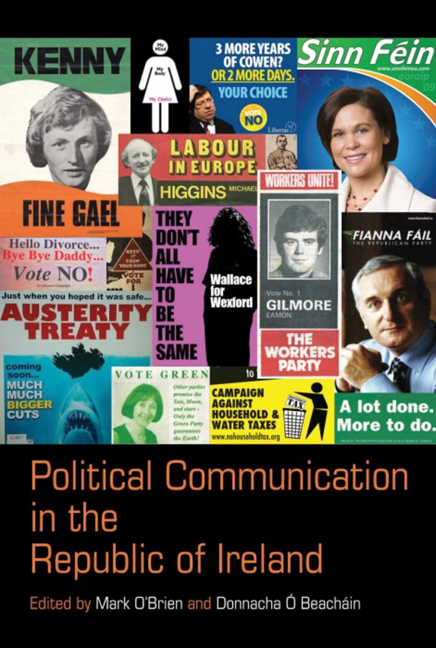Book contents
- Frontmatter
- Contents
- List of Illustrations
- Glossary
- Notes on Contributors
- Acknowledgements
- Introduction
- Part One Political Communication and Politicians
- Part Two Political Communication and Journalism
- Part Three Political Communication and the Public
- 9 A private affair? Lobbying and transparency in modern Ireland
- 10 Equal time for Judas Iscariot? Broadcast treatment of political contests in the Republic of Ireland
- 11 ‘There now follows …’: The role of the party political broadcast and the 2007 ‘peace broadcast’
- 12 Social media and political communication
- 13 Mediating elections in Ireland: evidence from the 2011 general election
- Conclusion
- Index
11 - ‘There now follows …’: The role of the party political broadcast and the 2007 ‘peace broadcast’
from Part Three - Political Communication and the Public
- Frontmatter
- Contents
- List of Illustrations
- Glossary
- Notes on Contributors
- Acknowledgements
- Introduction
- Part One Political Communication and Politicians
- Part Two Political Communication and Journalism
- Part Three Political Communication and the Public
- 9 A private affair? Lobbying and transparency in modern Ireland
- 10 Equal time for Judas Iscariot? Broadcast treatment of political contests in the Republic of Ireland
- 11 ‘There now follows …’: The role of the party political broadcast and the 2007 ‘peace broadcast’
- 12 Social media and political communication
- 13 Mediating elections in Ireland: evidence from the 2011 general election
- Conclusion
- Index
Summary
The 2007 general election in Ireland was notable for the intervention of Tony Blair and Bill Clinton – and former US senator George Mitchell – and their appearance in a political broadcast endorsing incumbent Taoiseach Bertie Ahern. This involvement went beyond what might be described as ‘celebrity endorsement’ but rather was an attempt to influence Irish voters by strengthening sentiment toward Ahern eight days before the 24 May 2007 poll. The trio of international political figures endorsed Ahern with a focus on his role in the Northern Ireland peace process although they also referenced his leadership in creating the Irish Celtic Tiger economy.
The New York Times (Quinn, 2007) described the intervention as ‘an unusual gesture of support.’ Nevertheless, the decision to call in ‘international support’ – as the Reuters News Agency (Hoskins, 2007) put it – was part of a carefully planned campaign strategy devised by Ahern's Fianna Fáil party. Seeking a third successive term, after ten years as leader of the major party in coalition governments, Ahern faced an uphill battle to remain in office amid allegations of political impropriety and a resurgent opposition. Positive endorsement from these international figures was an attempt to stress Ahern's ‘statesman-like leadership standing’ against his more inexperienced challengers. The so-called ‘peace broadcast’ was a significant departure from the traditional approach to broadcast political advertising in Ireland not just with its external political endorsement but also its overwhelming presidential-style focus in a parliamentary system.
The legislative regime in Ireland prohibits the broadcast of advertisements ‘directed towards a political end’ (Oireachtas, 2009). The ban on paid political advertising, similar to that in the United Kingdom, applies not just to political parties and election candidates but also to organisations promoting issues considered to be of a political nature. The regulatory arrangements do, however, allow registered political parties access to a system of free but controlled advertisements during election and referendum campaigns.
This system of free political advertising during election and referendum campaigns is known as party election broadcasts in the United Kingdom, but the term party political broadcast (PPB) is more commonly used in Ireland. In a restricted advertising regime these broadcasts remain the main way in which political parties ‘communicate in an unmediated fashion with voters’ (Negrine, 2011, 390).
- Type
- Chapter
- Information
- Political Communication in the Republic of Ireland , pp. 185 - 200Publisher: Liverpool University PressPrint publication year: 2014



